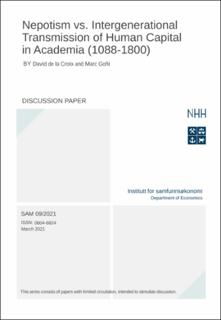Nepotism vs. Intergenerational Transmission of Human Capital in Academia (1088–1800)
Working paper

Åpne
Permanent lenke
https://hdl.handle.net/11250/2734312Utgivelsesdato
2021-03-16Metadata
Vis full innførselSamlinger
- Discussion papers (SAM) [657]
Sammendrag
We argue that the waning of nepotism in academia bolstered scientific production in pre-industrial Europe. We build a database of families of scholars (1088–1800), measure their scientific output, and develop a general method to disentangle nepotism from inherited human capital—two determinants of occupational persistence. This requires jointly addressing measurement error in human capital proxies and sample selection bias arising from nepotism. Our method exploits multi-generation correlations together with parent-child distributional differences to identify the structural parameters of a first-order Markov process of human capital transmission with nepotism. We find an intergenerational human capital elasticity of 0.59, higher than that suggested by parent-child elasticities, yet lower than multi-generation estimates ignoring nepotism. In early academia, 40 percent of scholars’ sons achieved their position because of nepotism. Nepotism was lower in science than in law and in Protestant than in Catholic institutions, and declined substantially during the Scientific Revolution and the Enlightenment—two periods of buoyant scientific advancement.